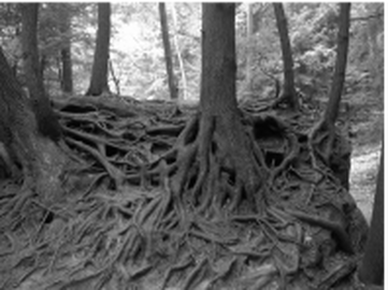BIO 4010/6010-01/ENG 4460/6460-02: Eco-Narratives |
Dr. Thomas Rooney, Department of Biological Sciences, [email protected]
Dr. Hope Jennings, Department of English Language and Literatures, [email protected]
Dr. Hope Jennings, Department of English Language and Literatures, [email protected]

This course engages students with immersive, integrated ecological and literary research, reading, and writing. Through biocultural perspectives, we will explore place-based narratives in ecological studies, material ecocriticisms, and climate fictions. Readings and class discussions will emphasize the importance of effective storytelling to scientific and literary representations of humans and nonhumans in their shared environments. We will think about different modes, patterns, and forms of narrative practices when telling eco-centered stories, and the necessity of collaborative storytelling projects when addressing the complexities of environmental conditions at the intersections of scientific and humanities-based inquiry. Individual and group assignments will provide students with opportunities to write their own eco-narratives about specific environments, incorporating key themes and motifs from assigned texts and class topics, such as: extinctions, rewildings, restorations, invasions, mutations, adaptations, naturecultures, nonhuman life cycles, place histories, and human/nonhuman encounters.
Students who successfully complete this course will be able to:
REQUIRED TEXTS
Octavia Butler, Dawn (Xenogenesis, Bk. 1) (1987). Aspect, 1997. ISBN: 9780446603775
Jeff VanderMeer, Annihilation. Farrar, Straus and Giroux, 2014. ISBN: 9780374104092
Additional readings (Provided in Pilot) include excerpts from:
Rachel Carson, Silent Spring
Aldo Leopold, A Sand County Almanac
Lauret Savoy, Trace: Memory, History, Race, and the American Landscape
Anna Tsing, The Mushroom at the End of the World
Robert McFarlane, Underland
Richard Powers, The Overstory
Kim Stanley Robinson, New York 2140
Students who successfully complete this course will be able to:
- Identify and explain the methods and models that scientists, environmental scholars, and fiction writers employ when researching and narrating eco-centered stories;
- Understand the intersections of scientific and literary interests and how these interdisciplinary perspectives might be used toward collaborative storytelling practices;
- Understand how cultural, biological, political, and historical factors play an important role in shaping the kinds of narratives that are told about places and their ecologies;
- Understand how the use of characterization, setting, point of view, imagery, and other literary elements convey meaning in scientific, nonfiction, and creative writing;
- Demonstrate thoughtful reading of literary and scientific texts and express interpretations about assigned readings and their related themes both orally and through writing.
REQUIRED TEXTS
Octavia Butler, Dawn (Xenogenesis, Bk. 1) (1987). Aspect, 1997. ISBN: 9780446603775
Jeff VanderMeer, Annihilation. Farrar, Straus and Giroux, 2014. ISBN: 9780374104092
Additional readings (Provided in Pilot) include excerpts from:
Rachel Carson, Silent Spring
Aldo Leopold, A Sand County Almanac
Lauret Savoy, Trace: Memory, History, Race, and the American Landscape
Anna Tsing, The Mushroom at the End of the World
Robert McFarlane, Underland
Richard Powers, The Overstory
Kim Stanley Robinson, New York 2140
